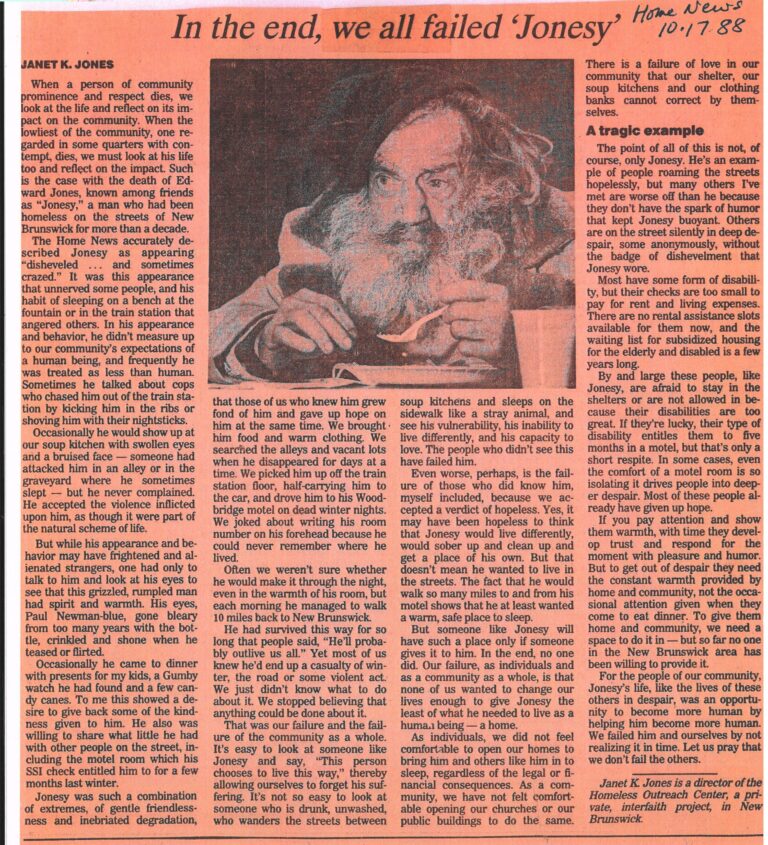Re-Creating Jonesy –
As this 30-day blog challenge comes to an end, I’m turning my thoughts back to the novel I’m wrapping up, one I’ve mentioned a couple times. It’s set in a fictionalized New Brunswick, NJ, and features a number of secondary characters based on people who used to come to our street-corner dinner every night.
In digging through old newspaper clippings for ideas, I ran across this eulogy I wrote for Jonesy. If I were to write it today, I’d do it differently…more sensitive word choices, less stiffness of tone. But that’s what I knew then.
When he died, I’d known Jonesy for seven years, since the time my not-yet-husband and I moved into a tiny, roach-infested apartment in the house where Joyce Kilmer was born. It was preserved as a historical site, and we were the new caretakers.
The building had been vacant a couple years but had housed the City’s Office on Aging. In the back corner of the lot sat a broken-down van abandoned by the City. We were surprised and a little disturbed one evening to see an old man and two dogs climb into the van.
Neither Bob nor I had yet had any relationship with people living outdoors. We cautiously approached Jonesy and his dogs at first. Everyone was friendly, though we still didn’t establish a relationship. We coordinated so our dogs weren’t in the yard at the same time; mine would have started a fight. Once we saw smoke coming from the van and rousted Jonesy out of there…newspapers smouldering, so it was stopped before it went further.
I was soon pregnant with Alexis. Not long after she was born, I got a job at a high school in another town. We moved. I don’t know how long Jonesy stayed in the van.
I didn’t connect with Jonesy again until 1986, though occasionally I’d see him and his dogs from a distance downtown. The City closed the men’s shelter that spring, which is when we started serving dinner in the yard next to it, originally as an organizing tool while we worked with the men and Legal Aid to open it again. Soon it was obvious it would be a battle of wills with the mayor, so we moved dinner to a prominent street corner.
By the time Jonesy joined us for dinner, his dogs were gone. He was alone. Sometimes he didn’t interact much; others, he was outgoing, flirting and making jokes. He called me “Peaches.” He brought found toys and candy canes for my toddler and preschooler. He was there most every night, probably never entirely sober in our presence.
He was one of the men who got a motel room in the winter of ’87-88 (ref. #NanoPoblano Day #24). He continued to come to dinner, so consistently that on a couple cold nights when he didn’t show up, we went looking for him.
We all grew to be quite fond of Jonesy, and our little community was devasted in October 1988 when we learned he’d been hit by a truck. He wasn’t the first; he wasn’t the last. But he was, for a while, the one we’d been closest to. A couple years later Greg, a younger guy who hung out with us a lot, was killed by a car.
When Jonesy died, I was upset and took to my journal. I just now looked up that entry and saw pages of incomplete thoughts, me struggling to capture the horror, anger, heartbreak. In the end I was able to pull it together into the essay in this newspaper clipping. I can still remember how tightly strung I was while typing it, afraid I’d let too much feeling come through.
I was pretty sure The Home News would print my piece. They knew Jonesy. They pulled that photo from their archives, an article about a church’s soup kitchen. It may even have been their reporter who told me Jonesy died. They used to call our house for comment when things like that happened.
In those days, to get a piece in the paper, you snail-mailed it to the “letters to the editor” page, then they’d call to confirm you really wrote it. I felt such urgency that I couldn’t wait for the mail and dropped it off. The next day the editorial page editor called, and after working through the details, she said, “You missed your calling. You should have been a writer.” I mumbled something to bypass her statement. My self-esteem was so far down the drain that I thought she was being sarcastic.
But I was glad they published it a few days later, though highly annoyed they’d changed an important descriptor. I’d referenced Jonesy’s friendliness – a key part of his personality – and they’d changed it to “friendlessness.” I imagine it was an unconscious error, perhaps a typesetter seeing what they expected of a homeless man, instead of what was actually on my page.
It happened to come out the day of his memorial service. Several of the men from dinner attended, along with our activist friends and church members who knew Jonesy.
Greg was there, upset, and thanked me for what I had written. By the time he was killed, I couldn’t write grief sentences.
As I said at the outset, all this comes back to me as I work on my novel. I imagine my setting and see Jonesy, Greg, Adam, Ernie, Perry, Andy, Susan, and so many more. My task is to flesh out characters based on them, to make my story more engaging by bringing those characters to life with details from my memory.
These memories are so old. I’m kind of hoping once the novel is done, they will be able to rest.


